UPCOMING SPEAKERS & EVENTS
Join us in person or on Zoom for monthly Western Hort programs designed to inform, educate and inspire the dedicated plant lover.
Meetings are held 9 times a year (Sept-May) on the second Wednesday of the month and feature a lecture and slide presentation by a guest horticultural specialist. Each program also includes a member-led discussion and photos of unusual plants.
Meetings often include a sale of diverse plant varieties donated by members and local nurseries as well as books, seeds, tools and other horticultural items on occasion. The meetings are free for members, non-member attendees are $10. All are welcome!
Meetings are held in the Garden House at Shoup Park, 400 University Ave., Los Altos.
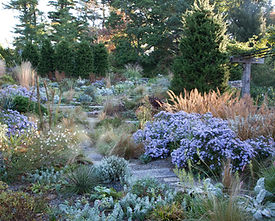

February 11th, 2026, 7:30pm
Chanticleer Gravel Garden
by Lisa Roper, Horticulturalist at Chanticleer Garden
For the past 11 years, Lisa Roper has managed the Gravel Garden at the renowned Public Garden Chanticleer in Wayne, Pa. A gently sloping site planted with a mix of fine textured grasses, gray-leafed Mediterranean plants, drought tolerant perennials, annuals grown from seed and hardy succulents, the gravel garden is a stunning and unique landscape. Lisa will discuss some of her design choices, favorite plants, combinations, planting techniques and the importance of editing. She will also touch upon her photography techniques.
Lisa Roper is the Gravel Garden and Ruin horticulturist at Chanticleer, a public garden in Wayne, PA, where she has gardened for the past 35 years in various parts of the garden. Lisa also photographs Chanticleer Garden weekly for What’s in Bloom on the Chanticleer website. Lisa has a BFA in fine art from The Cooper Union in NYC where she studied fine art and photography. She is a graduate of the Longwood Gardens Professional Gardener Training Program. Lisa has been a guest gardener at Stellenbosch University Garden in South Africa and Great Dixter in East Sussex, UK. She is also a contributor to The Art of Gardening, design inspiration and planting techniques from Chanticleer.
If you enjoy these talks and want to help the Western Horticultural Society sustain our program, you might like to sponsor one of our speakers! Your donation helps cover the costs of hosting a speaker and we will note your name as sponsor in our newsletter. You can choose the month or speaker of your choice or perhaps you have a speaker you would like to propose? Contact Leslie Dean at info@westernhort.org about donations or questions.

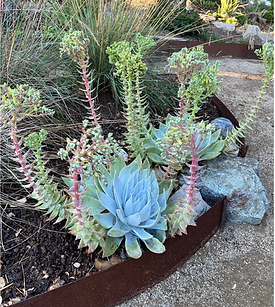
March 11th, 2026, 7:30pm
Landscaping for Fire Protection
by Nikki Hanson
What kind of home landscape can be both aesthetically pleasing and more fire-resistant? Savvy choices in plants, placement and landscape materials are the key ingredients that can make a world of difference. Nikki will share her experience and practical knowledge to help us understand this overwhelming topic. She will show us before/after photos from gardens she has installed and discuss which plants are chosen, and why. Nikki also takes into consideration how the mini-ecosystem of a garden can best support local, native animals and insects.
Plants have always been a big part of Nikki Hanson’s life and career. In 2020, after almost 20 years working in native plant production, habitat restoration and research, she decided to focus on gardening and land management in fire-prone areas. As a result, her own business, California Sisters Landscapes was born. Being a third generation La Honda/mountain resident and spending time on the South Skyline FireSafe Council has given her the background and familiarity with the myriad of challenges facing a wildland homeowner. During the last five years, Nikki has created educational materials on fire safe(r) landscaping (including resources available on her website), she has planned and implemented roadside fuel reduction, and helped many urban and wildland residents to create pleasing fire safe(r) landscapes.
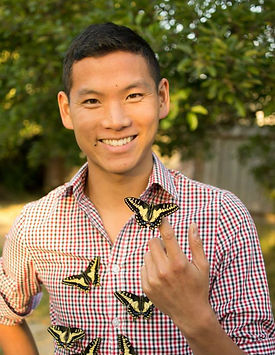
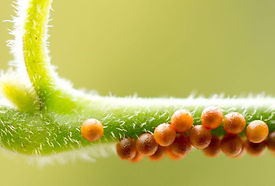
April 8th, 2026, 7:30pm
Gardening for CA Pipevine Swallowtail and Other Butterflies in the SF Bay Area
by Tim Wong
Tim Wong, garden manager at Sisterhood Gardens, will speak about how the mixed use spaces at this San Francisco community garden have been successful in attracting native pollinators and have also supported the creation of new dahlias. Tim will share his experience in attracting California Pipevine swallowtail butterflies, and his initial findings in hybridizing dahlias, the flower of San Francisco.
Tim’s love for butterflies started in his youth, raising butterflies from caterpillars in his backyard in San Mateo County. Today, Tim is a Senior Biologist at the California Academy of Sciences, where he has worked with the museum’s living collection for the past 15 years. Tim works on horticulture in the Osher rainforest exhibit and coordinates the living butterfly display. When not in the rainforest, Tim may be diving in the Philippine coral reef aquarium or feeding the museum’s colony of African Penguins. Outside of the museum, Tim can be found tending a growing collection of Dahlias, many of his own hybrids, and tending the butterfly resource plants of Sisterhood Gardens.
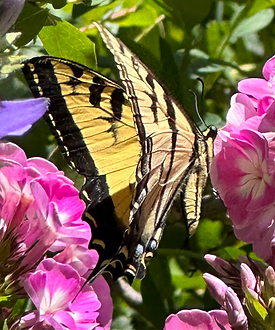
May 13th, 2026, 7:30pm
Vendor and movie night: Sexual Encounters of the Floral Kind
Talks about pollinators, both their importance and how to offer them a top-notch habitat, have become popular in recent years. But what about how that pollination actually happens? Sexual Encounters of the Floral Kind takes us into the world of pollination, indeed, inside the flowers themselves. This film was commissioned by David Attenborough and produced by Oxford University for a TV series called “The World About Us”. It may date from 1981, but the story it tells (and shows!) about the unusual ways plants coerce insects, birds, mammals and spiders to engage in behavior that fulfills the act of pollination is still fresh, astonishing, delightful and at times, hilarious.
